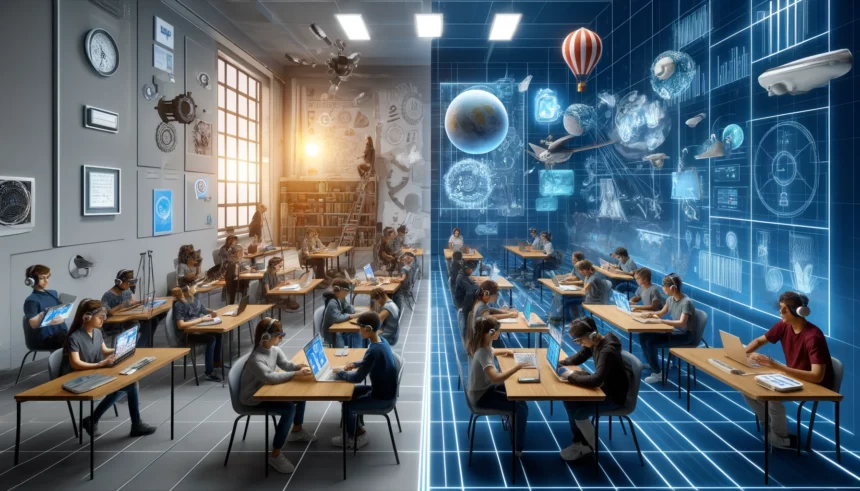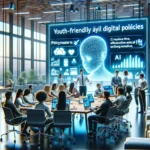In recent years, education has undergone a significant transformation due to technology. Traditional classrooms with chalkboards and textbooks are increasingly being supplemented, and sometimes replaced, by digital tools and online platforms. This shift is driven by the need for flexible learning environments, the abundance of educational resources online, and the continuous evolution of technology itself. Just like how industries like B2B sales have adapted to technological advancements, education is evolving rapidly. This article explores the impact of technology on education, highlighting both the opportunities and challenges of this digital revolution.
The Rise of E-Learning
E-learning, or electronic learning, uses electronic media and information and communication technologies (ICT) in education. It includes web-based learning, computer-based learning, virtual classrooms, and digital collaboration. Online learning platforms are a key part of this new educational model, offering a versatile and accessible way for students and teachers to connect and engage.
Benefits of E-Learning
- Flexibility: Traditional education often requires students to stick to a fixed schedule and location, which can be restrictive for those with other commitments, like work or family. E-learning allows students to learn at their own pace and on their own time, making it particularly beneficial for adult learners and those pursuing continuing education.
- Wealth of Resources: From video lectures and interactive simulations to digital textbooks and scholarly articles, students have access to a vast array of educational materials. This supports diverse learning styles and enables personalized learning experiences.
- Personalized Learning: Advanced tools like artificial intelligence (AI) and machine learning can tailor educational content to individual needs, enhancing the effectiveness of learning.
Challenges of E-Learning
- Digital Divide: The gap between those with access to modern information and communication technology and those without can exacerbate educational inequalities, especially in underserved and rural areas where internet access and technological infrastructure may be lacking.
- Decreased Social Interaction: Traditional classrooms offer face-to-face interaction, group activities, and social learning, which are essential for a well-rounded education. E-learning environments, while often collaborative, may lack the same level of personal connection and engagement. Educators and developers must find innovative ways to foster community and interaction in online settings.
Emerging Technologies in Education
While e-learning has been a significant step forward, the impact of technology on education extends beyond online courses and digital classrooms. Emerging technologies like virtual reality (VR), augmented reality (AR), and AI are set to further revolutionize the educational landscape.
Virtual Reality and Augmented Reality
- Virtual Reality (VR): VR offers immersive learning experiences that can enhance understanding and retention of complex concepts. For example, medical students can use VR to simulate surgeries, providing hands-on experience in a controlled environment.
- Augmented Reality (AR): AR can bring static images to life, allowing students to explore three-dimensional models of historical artifacts or scientific phenomena.
Artificial Intelligence
- Personalized Learning: AI can analyze student performance and learning patterns to provide customized feedback and recommendations. This level of personalization can help identify and address learning gaps more effectively than traditional methods.
Blockchain Technology
- Secure Academic Records: Blockchain can enhance the security and transparency of academic records and credentials. It ensures that educational certificates and transcripts are tamper-proof and easily verifiable, which is particularly useful in the global job market.
The Future of Education
The future of education is closely linked with the advancement of technology. As we move forward, it is crucial to address the challenges and ensure that the benefits of technological advancements are accessible to all. Policymakers, educators, and technologists must work together to bridge the digital divide, foster inclusivity, and create innovative solutions that enhance the educational experience for all learners.
Embracing the Change
Technology’s impact on education is profound and multifaceted. E-learning and beyond offer unprecedented opportunities for flexible, personalized, and accessible learning. However, to fully realize these benefits, we must navigate the associated challenges and work towards a future where technology enriches the educational journey for everyone, regardless of their background or circumstances.
By embracing the potential of online learning platforms and other emerging technologies, we can create an educational environment that is more dynamic, inclusive, and effective than ever before. The journey towards this future is ongoing, and the possibilities are limitless.
















